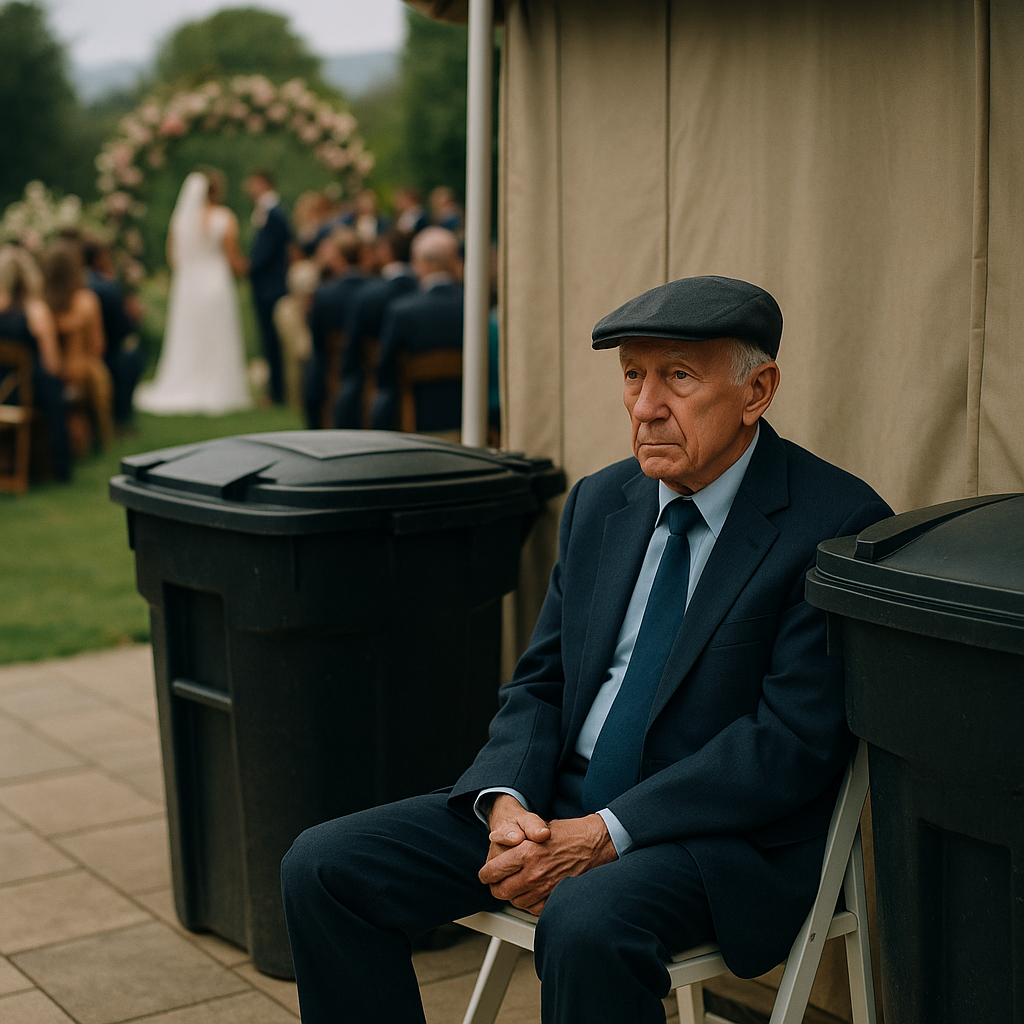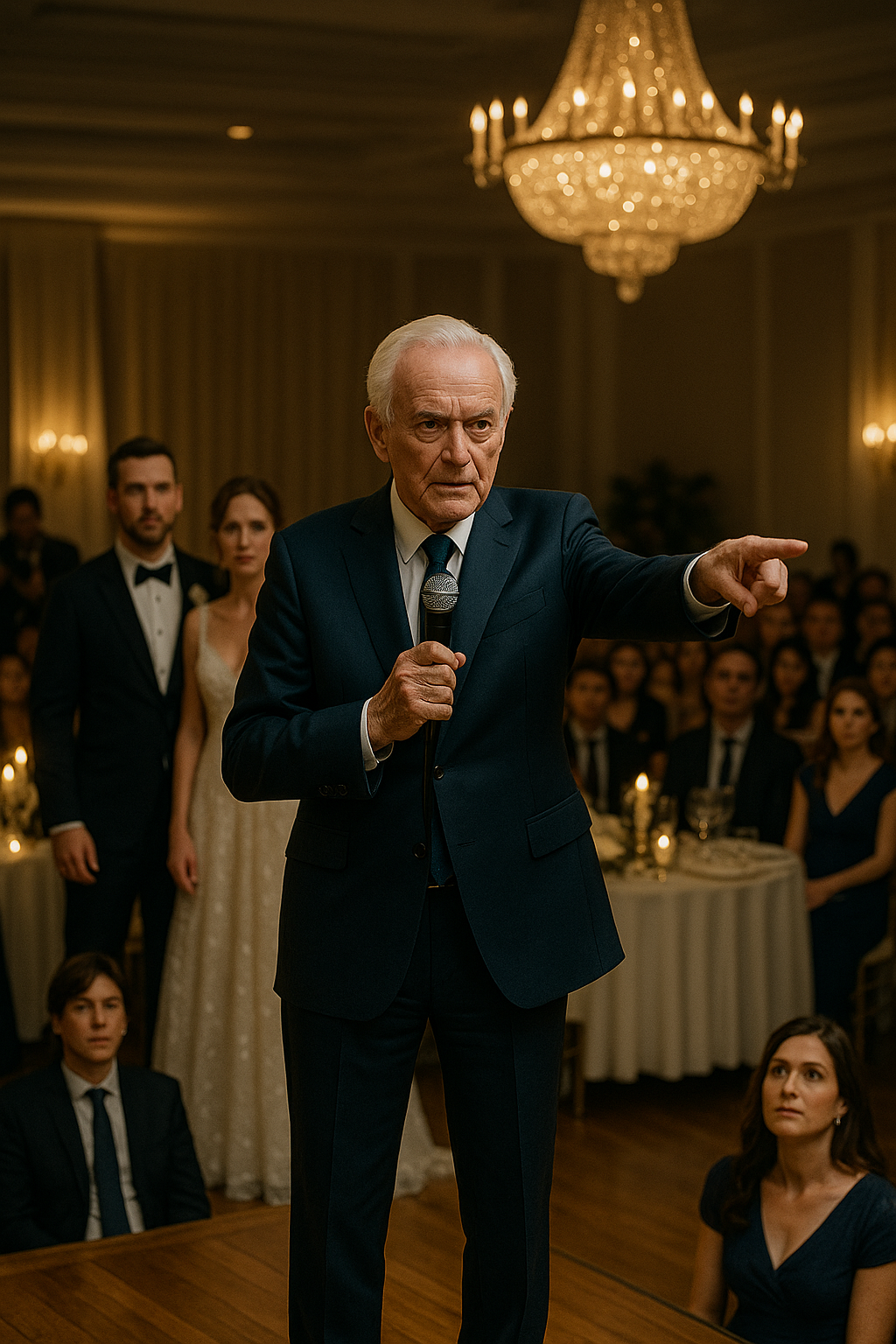An Uneasy Arrival
I showed up at my brother Jason’s wedding in Napa on a cool spring afternoon, wearing a thrifted dress. The air smelled of roses, grilled duck, and champagne, but none of it felt welcoming. A server brushed past without even noticing me.
Around me, guests sparkled in designer gowns and tailored suits. When I caught my reflection in the glass, I looked like an accident—messy hair, no makeup, nothing polished.
Then I saw my mother. She gave me a slow, critical once-over before saying, “You look… acceptable.” No hug. No warmth. She drifted off toward someone richer, tighter dressed, shinier.
Jason didn’t notice me either. He was too busy laughing with his fiancée, her gown glittering like it had swallowed my entire tuition. Her eyes slid past me with polite detachment.
I hadn’t come for drama. I came because, no matter what, they were still my family.
Grandpa’s Lonely Chair

A town car stopped, and out stepped Grandpa Joseph, 82, small but steady, in an old navy suit. His tie was crooked, but his eyes lit up when he spotted me.
“Kais,” he said, his voice rasping. “You’re the only reason I came.”
I hugged him tight, breathing in peppermint and aftershave. He had flown six hours, and yet no one else bothered to greet him. Instead, a staffer waved us away—around the kitchen, past the flower arch—until we arrived at his seat: one plastic chair wedged between two trash bins, humming vents behind him.
I froze. “There must be a mistake.”
But when I confronted my mother, she didn’t flinch. “He insisted on coming. I warned him. Beggars can’t be choosers.”
“He’s not a beggar,” I said softly.
Her whisper sliced sharp. “That old man will ruin us—how he eats, how he talks, how he smells.”
She wasn’t even pretending.
The Public Outcry
As guests settled, I stood up, tapping my glass. My voice shook. “Why is my grandfather seated near trash bins while strangers sit at the family table?”
The room went still. My mother stormed over, her hand striking my cheek. The sting burned, but I didn’t cry. She called me ungrateful and ordered me out.
Jason looked away. Dad studied the wine list. Only Grandpa moved—walking toward me, pressing a silk handkerchief into my palm, a faded “K” stitched on the edge.
I left, sitting alone at the stone wall outside, holding that cloth like a secret I didn’t yet know.
The Thunder of Jet Wheels
Then came the sound. A deep, rolling thunder.
A sleek Rolls-Royce pulled in, flanked by SUVs. The driver opened the door, and Grandpa stepped out. But this wasn’t the stooped old man from earlier. He stood tall, sharp suit, polished shoes, guards at his side.
He pulled off his glasses. “Ready to shake things up?”
I blinked. “What’s happening?”
He just smiled. “Let’s see if your brother remembers who owns this land.”
That was when I understood. This wasn’t a rented venue. This was Grandpa’s vineyard.
The Owner Returns

Grandpa walked into the reception, parting the guests. Jason stopped mid-sip. My father went pale. My mother froze, microphone in hand.
Grandpa’s voice filled the room: “I built this vineyard with these hands, named it after my late wife. But today, I sat near trash bins. That’s not a seat—that’s a message. And I received it.”
Silence. Then he said the words that turned every head:
“I built this empire for her, not you.”
He pointed at me.
Faces shifted. The bride whispered, “Who is she?” Cameras lowered.
Grandpa continued, his eyes on my father: “You changed the papers while I was recovering. You forged the affidavit. You stole from her.”
He handed me an envelope. “This always belonged to you.”
The Betrayal Uncovered
The next day, truth spilled faster than wine. A worker, Matteo, came forward with proof—Jason had poured chemicals into the wine tanks, destroying the last vintage my grandmother helped blend. Security footage showed it all.
At the emergency board meeting, I played the tape. Jason shouted, called it fake. Shareholders spoke of felonies. My father begged me not to destroy them.
Grandpa arrived with a lawyer. “A year ago, I revised the trust. Effective now, Kais controls the land, the winery, and every asset tied to it.”
The air went heavy. Jason stormed out. My mother stared like I was a stranger. My father slumped.
The Letter in the Garden
That evening, I walked to my grandmother’s garden, overgrown but still breathing her memory. Under an old vine, I dug up a rusted box. Inside lay a letter, written in her hand:
Kais,
If you’re reading this, you already know. They never saw your strength. But I did. This land doesn’t belong to the loudest. It belongs to the one who loves it.
I didn’t cry. I just sat in the dusk, for the first time not feeling like a guest. I felt home.
A New Beginning
Three weeks later, the vineyard glowed under lanterns. No photographers, no empty speeches. Just neighbors and workers who cared.
Grandpa raised his glass. “To the one who remembered what family should mean. This vineyard belongs to Kais—not because of blood, but because she loved it.”
My parents and Jason, uninvited, stood frozen. “You can’t do that!” Jason barked.
“Watch me,” Grandpa replied. The lawyer confirmed: irrevocable.
I took the microphone. My voice steady: “Nothing here was handed to me. It was planted. It grew. And it held when nothing else did.”
Later, under the moonlight, I touched the new plaque at the vineyard:
For Carmen. For those who bloom after being buried.
And I knew—I wasn’t just visiting anymore. This was mine.
